Our hometown at the foot of the Julius-Echter-Berg
Iphofen
The small wine town of Iphofen was first mentioned in a document in 741 AD. Its history began as a Franconian royal court, a farm whose yields accrued to the newly founded diocese of Würzburg. Iphofen was situated on the important route from Frankfurt via Würzburg and Fürth to Regensburg. The old royal road is still the axis which the B8 or the ICE railway from Frankfurt to Nuremberg run along.
Iphofen received the title of town from the Bishop of Würzburg in 1293 because the Würzburg bishopric was expanding its territorial dominion, and Iphofen was its south-eastern border town. The Würzburg bishops shaped the small town’s history until secularisation in 1810. One of the most important was Prince-Bishop Julius-Echter of Mespelbrunn (1545-1617), after whom Iphofen’s most famous vineyard is named. Wine, gypsum and wood have been the foundations of Iphofen’s prosperity since the Middle Ages. In 1949, the Knauf brothers built their first gypsum plant in Iphofen. In the meantime, the headquarter of the world’s largest gypsum company, which is still family-owned, is located here. The Knauf Museum displays a collection of reliefs of the great cultural epochs of antiquity, which is unique of its kind in Europe and other changing exhibitions.
Guests are always welcome in our well-kept town (www.iphofen.de). Whether in one of the small hotels, in a holiday flat, in your own mobile home or the famous romantic hotel Zehntkeller. There is a wide range of guided tours, even a carriage ride through the town and vineyards. As a restaurant, we recommend the Iphöfer Kammer, located directly on the market square serving our wines combined with fine regional cuisine in a small space. Besides, there are many other culinary offerings, e.g. Kulinarium 99, Achtele, Weißes Ross and Deutscher Hof. A hidden gem is Blumencafé Holzheimer, opposite of our estate.





